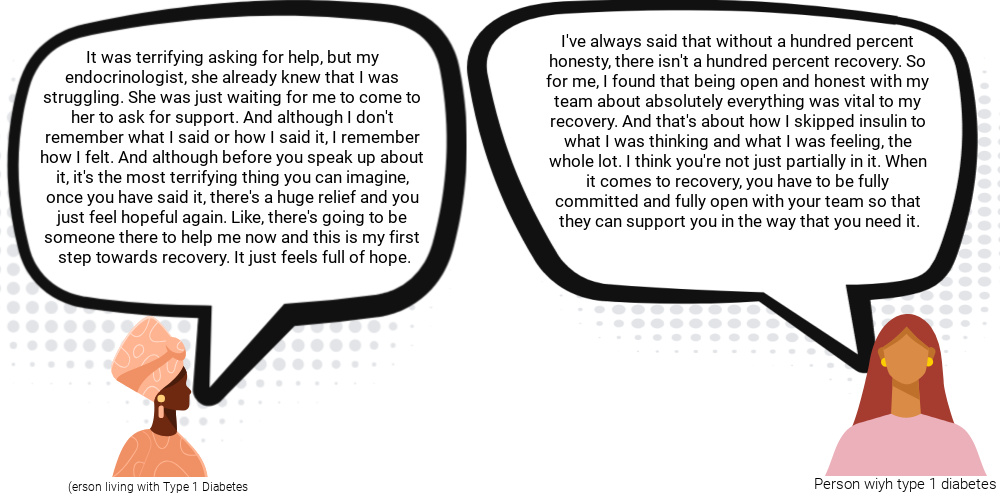
Starting the conversation
Click below to find tips for taking the next steps.

If you are concerned about having an eating disorder a helpful first step, often described by people who have experienced these difficulties, is to open up to a trusted person you know, whether that be a friend, family member or healthcare professional. You could share with them some of the information from this module to start to conversation off.
If you have been keeping the problem a secret it can feel daunting to speak up for the first time, however the other person’s response may surprise you, even if they don’t completely understand, they will usually feel some relief to know what has been happening and they can help you think about what next steps you might like to take. If their response isn’t what you’d expect or hope for then don’t give up, try someone else until you have the support you need.
Outlined below are some tips for overcoming common obstacles to opening up for the first time.

Be kind to yourself, remind yourself of the fact that humans the world over engage in behaviours that they know are not necessarily good for them in the long term eg smoking, drinking more alcohol than recommended or not taking their medication exactly as prescribed etc. People do this because these behaviours are helpful in some way in the here and now (e.g they may help to reduce stress, to feel in control or to experience pleasure.)
Taking the risk to confide in a trusted person could help you share the burden of what has been happening and to work out together what to do next.
The ability to ignore something upsetting in life is a valuable tool that can help us cope during difficult times, it can create a bit of distance from difficult thoughts and feelings and protect emotional well-being in the short term. However, when ignoring becomes the only way of coping it can be a problem especially if it is based on the belief that there is nothing that can be done to improve the situation.
Lots of people do recover from an eating disorder and although it can feel frightening or overwhelming in the short term to talk about your feelings with someone else it is a really important first step towards recovery. Sometimes reading other people’s stories of hope and recovery can build your confidence in taking the first steps to opening up.
If you have been fearful about food, weight and shape then it is completely understandable that you will be concerned as to what might happen next if you open up. Try to name your fears for yourself and with whoever you open up to so that together you can devise a plan that feels comfortable for you. Starting to talk about this with someone else can help you to feel in control of the next steps that happen to get the balance right between restoring health and feeling comfortable in your body. Treatment is a collaborative process, where decisions are made jointly between you and your care providers

Friends and Family
If you are concerned about a loved one having an eating disorder it can be difficult to raise this issue with them, you might fear offending them, damaging the relationship or the conversation just getting shutdown.
Click on the people below to see some possible ways to open up a conversation such as asking open, non-leading questions.
Below are some useful contacts to find out more information:
BEAT The UK’s Eating Disorder Charity – Support for Carers - Beat (beateatingdisorders.org.uk) BEATs helplines and also their online support groups are open to carers as well as those with an eating disorder.
Carers UK – National Charity for Carers - Home - Carers UK
- You seem to be really worried about your weight / shape / body at the moment. What sorts of things are worrying you?
- Some people find it difficult to take their insulin regularly – how are you managing this at the moment?
- I’ve noticed you’ve been stressed around meal times more recently, what sorts of things are making it difficult for you?
- With empathy and acceptance
- In a way that makes it ok to say there is a problem
- Non-judgmentally and without jumping into problem solving straight away
Below are some useful contacts to find out more information:
BEAT The UK’s Eating Disorder Charity – Support for Carers - Beat (beateatingdisorders.org.uk) BEATs helplines and also their online support groups are open to carers as well as those with an eating disorder.
Carers UK – National Charity for Carers - Home - Carers UK
Click ‘Diabetes and eating disorders’ to return to the topic main page, or choose another section to explore.

Before becoming a diabetic I was fortunate enough to eat whatever I wanted and never put on weight since becoming diabetic i find I only have to look at food to put on weight.
I have experienced an eating disorder within my family (a close family member).
It was a very difficult time for everyone concerned and heartbreaking to see somebody close to you suffering.
Fortunately we were able to get help and advice from our GP and in time the problem was resolved.
Read
I am normally the person people/friends ask for advice from, and I am happy to help and talk through issues in life they may be experiencing, I actually find it quite hard to talk about myself and my feelings, and maybe admit I have a problem, I know I have friends/family that are there for me and I have people I can talk to if needed.